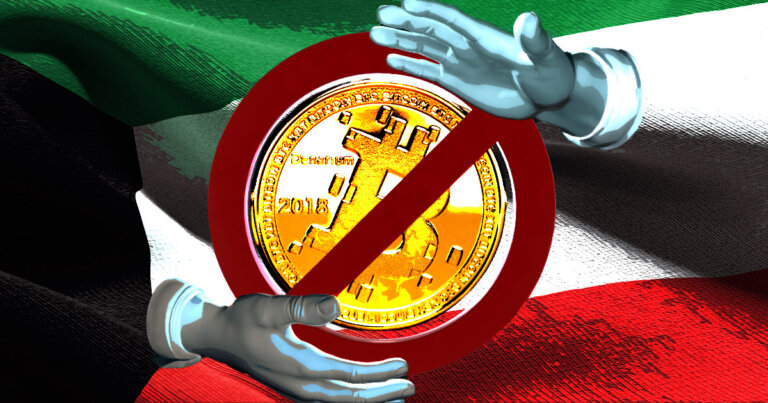 Kuwait imposes ‘absolute ban’ on virtual assets to combat money laundering risks
Kuwait imposes ‘absolute ban’ on virtual assets to combat money laundering risks Kuwait imposes ‘absolute ban’ on virtual assets to combat money laundering risks
The regulator warned that defualters would face strict penalties.

Cover art/illustration via CryptoSlate. Image includes combined content which may include AI-generated content.
Kuwait Capital Markets Authority (CMA) banned all forms of cryptocurrency use in the country, including mining activities, according to a July 18 circular.
The financial regulator imposed an “absolute ban” on all payments and investments involving cryptocurrencies, adding that it does not recognize virtual assets as a decentralized currency. A translated copy of the statement reads:
“Absolute ban of all asset/virtual currency mining activities.”
However, the release also stated that “virtual assets do not include digital representations of fiat currencies, securities, and other financial assets.”
CMA warned businesses and individuals in the country not to facilitate crypto-related transactions or investments as it has not issued any licenses.
Kuwait warned citizens about the risks attached to cryptocurrencies, adding that these assets lack legal status because they are not issued or backed by any government.
The regulator further stated that cryptocurrencies “are always driven by speculation that exposes them to a sharp decline.”
Defaulters of this new regulation would face penalties similar to violators of the country’s money laundering and terrorist financing act.
The CMA, the Central Bank of Kuwait, the Ministry of Commerce and Industry, and the Insurance Regulatory Unit jointly issued the circular.
Kuwait wants to combat money laundering through a crypto ban
According to its statement, the regulator attributed its decision to applying the Financial Action Task Force (FATF) recommendations on virtual assets.
While the FATF has advised countries to take measures to combat money laundering and terrorism financing, the international organization did not explicitly recommend banning cryptocurrencies.
The FATF website shows that the regulator recommends that competent national authorities monitor virtual asset service providers and that the service providers are subject to the same relevant FATF measures that apply to financial institutions.
Meanwhile, Kuwait CMA further claimed that the National Committee for Combating Money Laundering and Financing of Terrorism studied the sector before deciding on an absolute ban.
While several countries have rejected cryptocurrency’s use as a legal means of payment, an outright ban on digital assets for investment suggests that the regulator wants to stamp out the adoption of cryptocurrencies in the country altogether.



























































